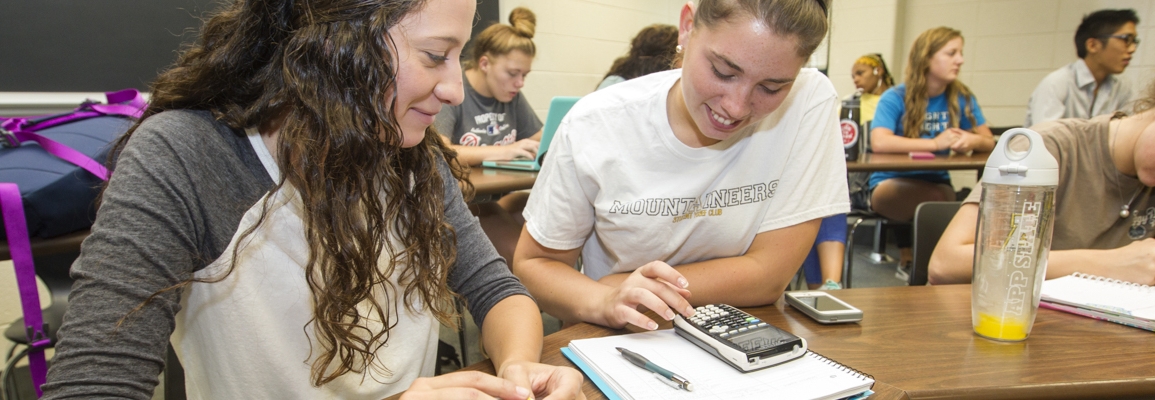Why should I major in the mathematical sciences?
Creative problem solvers, analytical thinkers, effective computer users, creators of mathematical models, experts at dealing with data, proficient speakers and writers -- we want these things and more to be said of our graduates. In our department, majors will hone these skills.
Each year CareerCast.com rates the best jobs. In its results for 2019: Demand for Data Scientists is high with a 19% growth outlook, and the skill set required to work in the field comes at a premium. Other numbers-based professions ranking among the 10 best jobs of 2019, Statistician and Mathematician, both have outstanding outlooks and great pay. In fact, 6 of the top 10 jobs are math, statistics, and/or computation related!
What will a graduate be trained for? Past graduates have been employed in many areas related to education, business, and science, including: middle school and high school teaching; actuarial science and insurance; applications programming; statistics and data analysis; manufacturing quality control; engineering tech; medical data analysis; management; and college teaching. Take a look at the Internship and Career Opportunities page for more information.
Which math program is right for me?
There are several programs in the mathematical sciences at Appalachian designed to fit a wide variety of interests.
- Bachelor of Science in Actuarial Sciences: Mainly for students interested in careers in actuarial sciences, financial analysis, the insurance and banking industries, and government agencies such as the Census Bureau.
- Bachelor of Science in Mathematics:The range of careers available to mathematics majors is very broad. The BS program is designed to be flexible to allow you to concentrate on an area particular to your own interests. In addition to a strong mathematics core of courses, you would take 18-25 hours in a career-related field, such as
- Business
- Computation
- Life Sciences
- Physical Sciences
- Secondary Education
- Statistics
- Bachelor of Arts in Mathematics: Designed for students focused on a liberal arts education. Some of the mathematics requirements are replaced with more humanities, in particular, a foreign language and a minor outside of the mathematical sciences are both required.
- Master of Arts in Mathematics: Designed for students who wish to pursue graduate coursework in mathematics. Students will deepen their understanding of mathematics and also learn about secondary or college teaching.
- Certificate in Sports Analytics: Students from any major interested in data science focusing on the abundant information in sports of all varieties.
- Minor in Mathematics: Designed for students from outside of the mathematical sciences, the minor includes 13 hours, with 9 hours of credit beyond calculus 2.
- Minor in Statistics: Designed for students from outside of the mathematical sciences, the minor includes 12 hours of statistics.
To learn more about the programs of study for these majors, follow the links in the left sidebar.
How can I get a head start on graduate work?
Students who are approaching their senior year (90 or more hours complete) and who have a 3.4 GPA can request to be nominated for the Accelerated Master's Program. This program allows strong seniors to take graduate courses for some of their undergraduate electives and double count up to 12 hours at both the undergraduate and graduate level. [more information]
Are you a computer science or physics major thinking about a minor or double major in math?
Why would I want to?
- We have heard back from students who were told that they were chosen for interviews because they had a strong math background.
- More flexibility for career paths: engineering, business, operations research, management science
- Students with strong math backgrounds can choose a wider range of majors in graduate school: engineering, operations research, management science, computer science.
What would I need to do for a minor?
- Computer Science majors: You already need Linear Algebra, so just 2 more courses (for example, Calculus 3 and Numerical Methods - which can count as a CS elective!) is all you would need.
- Physics majors: You already need Calculus 3 and Differential Equations, so just one more course (for example, Linear Algebra or Advanced Differential Equations) is all you would need.
What would I need for a double major?
The most likely choice for you would be the Mathematics/Computation or Mathematics/Physical Sciences options. THINK ABOUT IT!!! Come to the department office in 342 Walker Hall and ask for an advisor to get more information!
